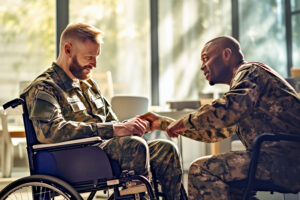 Military service members make significant sacrifices to protect our country, often putting their lives on the line. Unfortunately, many veterans face another battle after they return home: cancer. Due to the nature of their service, certain cancers have been linked to military service. Given the profound implications of cancer, veterans need to be aware of these risks and the benefits available to them.
The nature, scope, and even the location of their service may expose service men and women to certain risk factors that can cause cancer. Several types of cancer have been often associated with military service, including, but not limited to, the following:
Military service members make significant sacrifices to protect our country, often putting their lives on the line. Unfortunately, many veterans face another battle after they return home: cancer. Due to the nature of their service, certain cancers have been linked to military service. Given the profound implications of cancer, veterans need to be aware of these risks and the benefits available to them.
The nature, scope, and even the location of their service may expose service men and women to certain risk factors that can cause cancer. Several types of cancer have been often associated with military service, including, but not limited to, the following:
- Lung cancer
- Mesothelioma
- Prostate cancer
- Leukemia
- Non-Hodgkin lymphoma
- Bladder cancer
- Kidney cancer
- Multiple myeloma
- Pancreatic cancer
- Testicular cancer
Risk Factors for Military Service-Connected Cancers
Many factors can increase a veteran’s risk of developing cancer. These risk factors can be broadly categorized into exposure to harmful substances and other risk factors related to the nature of military service.
Exposure to the following harmful substances can significantly increase the risk of developing cancer:
- Toxic chemicals: Many veterans were exposed to harmful chemicals, such as Agent Orange and other herbicides, during their service. These chemicals are known carcinogens and can significantly increase the risk of developing various types of cancer, including lung cancer, prostate cancer, and non-Hodgkin lymphoma.
- Radiation: Veterans who participated in nuclear tests or worked as uranium miners may have been exposed to radiation, which is a well-known carcinogen. This exposure can increase the risk of developing several types of cancer, including multiple myeloma and leukemia.
- Asbestos and diesel exhaust: Certain military occupations involve exposure to asbestos or diesel exhaust, both known carcinogens. Veterans in these occupations may have an increased risk of developing lung cancer and mesothelioma.
Other risk factors for developing military service-connected cancers include:
- Service in high-risk locations: Veterans who served in places such as Vietnam, Iraq, and Afghanistan may have been exposed to environmental factors that increase their risk of developing cancer. These factors include exposure to burn pits, contaminated water, and other hazardous materials.
- Genetics: While not directly related to military service, genetics can also play a role in cancer development. Veterans with a family history of cancer may be at a higher risk of developing the disease.
Benefits for Veterans with Military Service-Connected Cancers
Veterans who have been diagnosed with a military service-connected cancer are eligible for several benefits, including:
- Medical care: The Department of Veterans Affairs (VA) provides medical care to veterans with service-connected disabilities, including cancer. This care may include doctor visits, hospital stays, surgery, chemotherapy, radiation therapy, and other treatments. Medical care also consists of the following cancer treatment:
- Surgery to remove tumors or cancerous tissue.
- Chemotherapy to kill cancer cells using drugs.
- Radiation therapy uses high-energy rays to kill cancer cells.
- Targeted therapy uses drugs that target specific molecules involved in the growth and spread of cancer cells.
- Disability compensation: Veterans with service-connected disabilities may be eligible for monthly disability compensation from the VA. The amount of compensation depends on the severity of the disability.
- Education and training: The VA offers education and training benefits to veterans to help them achieve their educational and career goals.
- Employment assistance: The VA provides employment assistance to veterans, including job search assistance, resume writing, and interview skills training.
- Financial assistance: The VA offers financial assistance programs to veterans struggling to support themselves and their dependents financially.
Military service-connected cancers are a serious issue that affects many veterans. There are many resources available to help veterans who have been diagnosed with cancer. By understanding the risks, treatment options for military service-connected cancers, and benefits available to them, veterans can take steps to protect their health and get the care they need.
